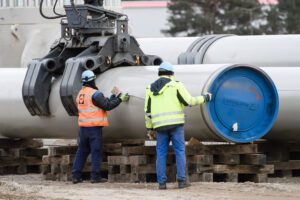
Independent experts as part of selection committees that select and vet officials for Ukraine’s judiciary and anti-corruption institutions will achieve changes that will be the most fundamental renewal of Ukraine’s judiciary since independence, the U.S. Embassy and EU delegation to Ukraine said.
“The involvement of independent experts is in compliance with international standards: their crucial role is temporary and justified by the extraordinary circumstances presented by the opportunity Ukraine now has to take a decisive step toward its destiny as a modern European nation,” a joint statement by the U.S. Embassy and the Delegation of the European Union posted on the website of the U.S. Embassy on Wednesday reads.
According to the diplomats, to seize that destiny, “we, as friends of Ukraine, stand with Ukraine’s leaders and ask them to act with political courage.” “As they consider the future, we urge them to think back upon the desires of the Ukrainian people. It is reform they demanded during the Revolution of Dignity and voted for, over and over again, in elections. It is now up to Ukraine’s leaders to make good on their promises. When they do so, there is no doubt but that the Ukrainian people will thank them,” it says.
The U.S. Embassy and the Delegation of the European Union believe that one critical prerequisite for the success of these reforms is the role independent experts, nominated by international partners of Ukraine, in the commissions that select and vet the individuals who serve in Ukraine’s judiciary and anti-corruption institutions — bodies that have enormous power to shape the future of Ukraine.
“It is a future where the country either remains beholden to the powerful interests who use their resources to protect themselves from justice or where all are entitled to equal protection before the law. Because these commissions will ensure that candidates with the highest professional competence and integrity will be selected as Ukraine’s future judges, Special Anti-Corruption Prosecutor, and NABU Director – those who will hold the corrupt to account – they have an important role in shaping Ukraine’s destiny,” the statement reads.
It is noted that for the same reason, the role of independent experts has become one of the most important issues in discussions about the future of the reform agenda in Ukraine.
“Independent experts threaten those who benefit from the current system and seek to retain control over the levers of power in Ukraine. Ukraine has proven that this is a successful reform model to ensure that a commission serves the Ukrainian people, and not the vested interests that seek to control it. The ongoing competition for the SAPO leadership serves as proof that independent experts’ decisive role in the selection process is critical to ensure that decisions are merit-based and not politically-motivated,” it says.
It is also noted that he Venice Commission clearly stated that giving the international members a prevailing vote in case of a tie after a repeat vote is acceptable from the viewpoint of national sovereignty, given that final decisions remain with the appointing body.
“The current draft laws, including on the High Qualification Commission of Judges, that are now in parliament need to be aligned with the Venice Commission opinion before their second and final reading,” the U.S. Embassy and the Delegation of the European Union stated.

The Cabinet of Ministers of Ukraine extended quarantine in Ukraine until August 31, 2021 and established new quarantine restrictions at the Wednesday meeting, the Health Ministry’s press service has said.
According to the statement, a “green” level of epidemic danger is established throughout the country, at which the mask regime is maintained in public transport during mass events.
The work of catering, entertainment venues (nightclubs), cinemas and halls of other culture sectors, as well as other public events are allowed, provided that the mask regime is observed.

Deputy Minister of Foreign Affairs of Ukraine Yevhen Enin received copies of credentials from the newly appointed Ambassador of the Republic of Korea to Ukraine Kim Heejoon.
“The Deputy Minister congratulated the Ambassador on the beginning of his diplomatic mission in Ukraine and expressed hope for further development and strengthening of Ukrainian-Korean relations,” the press service of the Ukrainian Foreign Ministry said.
Enin also acquainted the Korean diplomat with the Crimean Platform initiative, designed to unite the efforts of Ukraine and international partners in the de-occupation and reintegration of Crimea, urging them to join its practical implementation.
In particular, Enin and the ambassador agreed on the priority steps for the preparation of the Partnership Strategy of Ukraine and the Republic of Korea for 2021-2025, intensification of high-level political dialogue, revitalization of inter-parliamentary ties, interaction within the framework of the Intergovernmental Ukrainian-Korean Commission on Trade and Economic Cooperation.
“The parties agreed on the need for a fuller use of the existing potential of bilateral economic relations, an increase in the inflow of Korean investments in the production sectors of the Ukrainian economy, the implementation of joint projects. In the opinion of Yevhen Enin, special attention should be paid to the promotion of innovative projects related, in particular, to production, storage and the transportation of “green” hydrogen, the introduction of digital transformations, electric vehicles,” the Foreign Ministry reported.
The Deputy Minister and the Ambassador also discussed joint events in the context of celebrating the 30th anniversary of the establishment of diplomatic relations between Ukraine and Korea in 2022.

Germany may change its position on the Nord Stream 2 gas pipeline after the election of a new chancellor, which will be held in the autumn of 2021, Foreign Minister Dmytro Kuleba has said.
“In fact, there are many voices against North Stream 2 in Germany and Berlin’s position may change after their upcoming elections,” Kuleba said in an interview with the Hungarian edition of Ceenergy News.
He said that neither has the United States given up on sanctions completely, saying it is rather a break. “Our struggle to preserve Ukraine’s national interests and European security will continue. As one golden rule of diplomacy puts it, nothing is fully agreed before everything is agreed,” the minister added.
According to him, Ukraine adheres to a “clear position” on the Nord Stream 2 gas pipeline. “It is not only about Ukraine and our economic interests. It is very dangerous for the overall Euro Atlantic security and unity to give such a powerful political weapon as Nord Stream 2 in Vladimir Putin’s hands [Russian President],” he said.
Kuleba added that compromises on security have never worked well in the past. “Our main expectation is to convince our German and U.S. partners to take the existing threat seriously. This is what Ukrainian diplomacy is currently working on,” the Foreign Minister said.

The Ministry of Defense of Ukraine will transfer from its portfolio of assets three hotels in Kyiv, Lviv and Kryvy Rih to the State Property Fund (SPF) for further privatization, Deputy Head of the President’s Office Kyrylo Tymoshenko has said.
He said that these are the hotels Vlasta in Lviv, Kozatsky in Kyiv and Bratislava in Kryvy Rih.
“We thank the Minister of Defense. The letters have already been sent to the Fund, and I hope that in the near future these facilities will go for privatization,” Tymoshenko said at the Ukraine 30. Economy without Oligarchs forum in Kyiv on Wednesday.
According to him, these hotels are non-profit-making.

Radisson Hotel Group opened in Odessa on Derybasivska Street early June the seventh hotel of the chain in Ukraine – Radisson City Center Odessa, the press service of the company told Interfax-Ukraine on Tuesday.
“We are delighted to open the doors of our first Radisson hotel in Odessa,” Area Senior Vice President for Central & Eastern Europe, Russia and Turkey at Radisson Hotel Group Yilmaz Yildirimlar said, quoted by the company’s press service.
He said that Radisson is an upscale hotel brand that offers Scandinavian-style hospitality and has a strong potential for development in the Ukrainian market. Now it is represented in Ukraine by 1,445 guest rooms, including hotels that are under construction.
According to the press service of the company, the Radisson Hotel City Center Odessa offers 90 rooms, decorated in a laconic Scandinavian style, with a view of Derybasivska Street and the historic city center. The hotel has the Gatto Nero restaurant with two halls, seating from 30-80 guests and a conference area for business travelers seating 85 guests.
The Radisson Hotel Group is one of the largest hotel groups in the world with nine hotel brands and over 1,500 hotels in 120 countries.